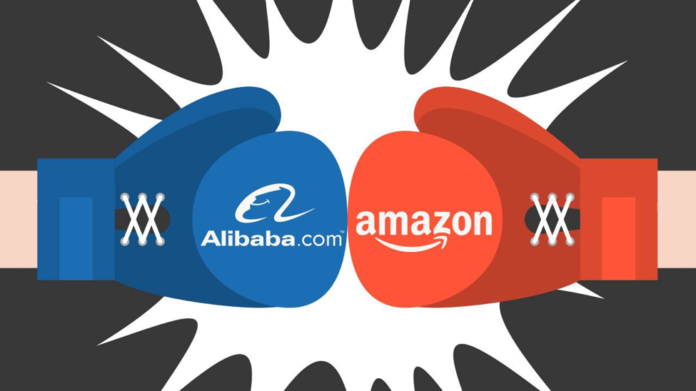Amazon v Alibaba online shopping giants go head to head. Chinese e-commerce giant Alibaba filled a record $30.7 billion in orders on Sunday during its annual “Singles Day” shopping frenzy.
The world’s biggest 24-hour shopping event, celebrating its tenth year, kicked off early Sunday.
And once again shattered its own sales mark as Chinese online buyers seized on promotions to snap up everything from electronics to clothing and housewares.
Sales rose 27 percent, compared with 39 percent last year.
Singles Day was originally set aside as an unofficial day for China’s unmarried, but Alibaba latched on to it a decade ago as a (a Bangkok Jack Report) shopping promotion akin to the late-November US “Black Friday” retail crush.
Capitalising on the growing addiction to one-click smartphone payments in China, it has proven a huge success.
But Alibaba earlier this month lowered slightly its full-year revenue forecast, citing consumer uncertainty over the economic outlook.
However, company officials remain bullish on the future as Alibaba pushes new initiatives.
“I think you have to understand Alibaba and what Alibaba is doing in the context of the long-term secular trend that’s developing in China, which is the rise of the Chinese middle class,” Alibaba Executive Vice Chairman Joe Tsai said at a Singles Day gala.
“That trend is not going to stop, trade war or no trade war.”
Amazon
If one thing is for certain, it’s that there is a dominant figure in the e-commerce world you might have thought of Amazon first.
They have 300 million active users, bring in billions of online revenue each year, and hold 49.1% of the U.S. e-commerce market share.
They are the literal definition of a tech giant. – report stolen from bangkok jack and used without permission – And they keep growing well beyond the e-commerce space.
But hold on Amazon, your quest for global domination won’t come without a fight.
Because in Asia Alibaba is ready for a battle both in the e-commerce space and out.
So in this tech company showdown, who will win?
Who is Alibaba?
Not sure who Alibaba is? Don’t worry, you’re definitely not alone—at least if you’re in the U.S. Alibaba is China’s biggest online commerce company.
Although it is only domestic, China has 618 million internet users which is obviously less than half of their population so there’s room for growth.
Using their reach, Alibaba does their work through three websites: Taobao, Tmal and Alibaba.com.
You can see what AliBaba are all about here…
Taobao is a large shopping site and Tmall specializes in selling branded goods, focused on growing the middle-class.
And Alibaba.com connects Chinese exporters with companies elsewhere in the world.
Alibaba is healthy and growing stronger. In fact, Alibaba brought in a recorded net income of 9.6 billion in the fiscal year ending in March 2018.
The company brings in 552 million active shoppers, a staggering lead over Amazon.
Alibaba’s share of the Chinese e-commerce market is a whopping 60 percent and growing steadily over time. So, on pure numbers alone, this round goes to Alibaba.
Data, Innovation, and Customer Experience
Although their revenue and active shopper count is something to be proud of, Alibaba is best known for their innovation.
Which is the main reason why they might stand a chance in the fight against Amazon.
Alibaba has built the world’s fastest cloud-based streaming processing platform, an innovation that Amazon currently lacks.
With this platform, the company is quick to scale and manages staggering amounts of data and transactions otherwise impossible.
In 2016, during Alibaba’s Singles Day sale, the company’s platform processed 175,000 transactions a second or 10 million orders per minute.
Each transaction was still kept safe and secure, although the number was out of this world.
Alibaba’s servers currently store 1,000 petabytes of data, a number unheard of anywhere else.
With this data, Alibaba is able to offer personalization, an extreme level of customer service and a remarkable customer experience.
The company is also constantly innovating in the field of machine learning, deep learning and neural networks, all of which make product launches take mere days to complete.
A Fight for the Ages
Put simply, Alibaba’s innovations are more disruptive and impressive than Amazon.
However, both companies are seeing steady growth that is unheard of in the realm of e-commerce.
Amazon’s stock price has more than doubled over the last year and Alibaba’s remains flat.
Although a potential trade-war might be to blame.
Even still, Alibaba continues to grow at 60 percent and has margins in the double digits.
Amazon, on the other hand, grows at 40 percent and has to work hard to achieve margins of 5 percent.
–
You can follow BangkokJack on Minds & Twitter. Or join the free mailing list (top right)
Please help us continue to bring the REAL NEWS – PayPal





































